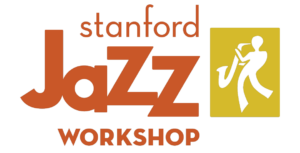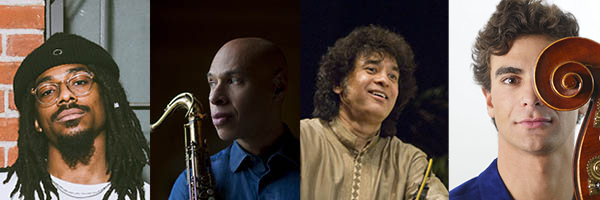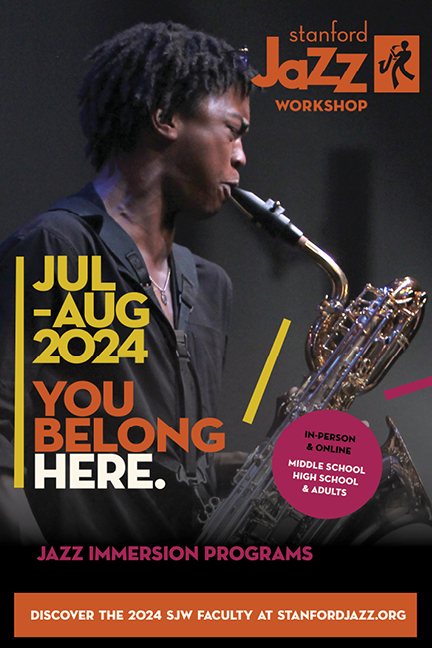Joshua Redman and Zakir Hussain, with Joel Ross and Zach Moses Ostroff
Frost Amphitheater
Thursday, July 1, 7:30 p.m.
Welcome back to live jazz! Thanks for joining the Stanford Jazz Workshop and Stanford Live for this special co-presentation featuring some of the most inventive instrumentalists in jazz. Saxophonist Joshua Redman, who the New York Times recently called “sublimely lyrical,” joins the trailblazing Grammy-winning tabla player Zakir Hussain at Frost Amphitheater for a perfect summer evening of beautiful, stimulating jazz. It’s hard to overstate Hussain’s contributions to jazz, and NPR has even called him “one of the architects of world music.” Redman and Hussain have long enjoyed their musical conversations, and tonight they’ll be joined be rising star vibraphonist Joel Ross, whose playing DownBeat magazine calls “consistent currents of electricity, high-powered and full of luminous energy.” Of bassist Zach Moses Ostroff, Taylor Eigsti has said he is “one of the most technically gifted bassists I’ve ever played with.”
“I’m excited to hear what these fantastic musicians will create this evening,” says Stanford Jazz Workshop founder and artistic director Jim Nadel. “Zakir and Joshua know each other well, they’ve both performed here at the Stanford Jazz Festival many times, and their duo performances are always astonishing. I’m looking forward to hearing how Joel Ross will interact with them — all three have a very conversational and collaborative style when they improvise. Zach Moses Ostroff has emerged as one of the leading bassists in the Bay Area. This is bound to be a special concert.”
More about Joshua Redman, saxophone
Joshua is one of the most acclaimed and charismatic jazz artists to have emerged in the decade of the 1990s. Born in Berkeley, California, he is the son of legendary saxophonist Dewey Redman and dancer Renee Shedroff. He was exposed at an early age to a variety of musics and instruments, and began playing clarinet at age nine before switching to what became his primary instrument, the tenor saxophone — which he played when he attended the Stanford Jazz Workshop Jazz Camp as a teenager.
In 1991 Redman graduated from Harvard College summa cum laude, Phi Beta Kappa. He had already been accepted by Yale Law School, but deferred entrance for what he believed was only going to be one year. Some of his friends had relocated to Brooklyn, and they were looking for another housemate to help with the rent. Redman accepted their invitation to move in, and almost immediately he found himself immersed in the New York jazz scene. He began jamming and gigging regularly with some of the leading jazz musicians of his generation: Peter Bernstein, Larry Goldings, Kevin Hays, Roy Hargrove, Geoff Keezer, Leon Parker, Jorge Rossy, and Mark Turner (to name just a few). In November of that year, five months after moving to New York, Redman was named the winner of the prestigious Thelonious Monk International Saxophone Competition. This was only one of the more visible highlights from a year that saw Redman beginning to tour and record with jazz masters such as his father, Jack DeJohnette, Charlie Haden, Elvin Jones, Joe Lovano, Pat Metheny, Paul Motian, and Clark Terry.
This period of tremendous growth and invaluable experience led Joshua to commit to a life in music, and he issued his first album in spring of 1993, which earned him his first Grammy nomination. That fall saw the release of Wish, where Joshua was joined by the all-star cast of Pat Metheny, Charlie Haden, and Billy Higgins.
Throughout the ‘90s, Joshua led bands and recorded with some of the greatest musicians in jazz, including pianist Brad Mehldau, bassist Christian McBride, guitarist Peter Bernstein, pianist Peter Martin, bassist Chris Thomas, drummer Brian Blade, pianist Aaron Goldberg, bassist Reuben Rogers, and drummer Gregory Hutchinson.
This prolific period saw Redman establish himself as one of the most consistent and successful bandleaders, as well as a composer with astonishing creativity and depth.In 2020 Redman reunited with his original quartet — Brad Mehldau (piano), Christian McBride (bass) and Brian Blade (drums) − with the release of RoundAgain on Nonesuch records. Throughout this time, Joshua has also shared his talents as an educator, teaching at SJW’s Jazz Institute, Stanford University, and the San Francisco Conservatory.
More about Zakir Hussain, tabla
Zakir Hussain is today appreciated both in the field of percussion and in the music world at large as an international phenomenon and one of the greatest musicians of our time. A classical tabla virtuoso of the highest order, his consistently brilliant and exciting performances have established him as a national treasure in his own country, India, and as one of India’s reigning cultural ambassadors. Along with his legendary father and teacher, Ustad Allarakha, he has elevated the status of his instrument both in India and around the world. His playing is marked by uncanny intuition and masterful improvisational dexterity, founded in formidable knowledge and study. Widely considered a chief architect of the contemporary world music movement, Zakir’s contribution to world music has been unique, with many historic collaborations, including Shakti, which he founded with John McLaughlin and L. Shankar, Remember Shakti, the Diga Rhythm Band, Making Music, Planet Drum with Mickey Hart, Tabla Beat Science, Sangam with Charles Lloyd and Eric Harland, and recordings and performances with artists as diverse as George Harrison, YoYo Ma, Joe Henderson, Van Morrison, Airto Moreira, Pharoah Sanders, Billy Cobham, Mark Morris, Alonzo King, and the Kodo drummers. His music and extraordinary contribution to the music world were honored in April, 2009, with four widely-heralded and sold-out concerts at Carnegie Hall’s Artist Perspective series.
More about Joel Ross, vibraphone
Joel Ross is refining an expression that’s true to his sound and his generation. The vibraphonist-composer regularly tops DownBeat Critics Poll and in 2017, he became one of the youngest artists to receive a coveted Residency Commission from The Jazz Gallery. Following critically-acclaimed debut KingMaker (Blue Note, 2019), Ross issued sophomore release Who Are You? (Blue Note, 2020), the culmination of a year-long exercise in risk-taking alongside members of his band Good Vibes: Jeremy Corren, Immanuel Wilkins, and Standord Jazz Workshop alumni Kanoa Mendenhall and Jeremy Dutton.
With each release, Ross reaffirms a commitment to authentic discourse. He saturates live sets with a lyrical intuition that’s equally grounded in melody and phrasing. Collaborative work includes associations with Makaya McCraven (Universal Beings, 2018), Maria Grand, Kassa Overall, Nicole Mitchell, Gerald Clayton, Melissa Aldana (Visions, 2019), Walter Smith III (In Common, 2018), Wynton Marsalis & the Jazz at Lincoln Center Orchestra, and Marquis Hill. Ross draws inspiration for his layered expression from vital music scenes of his native Chicago. As a leader, he’s appeared at such storied venues and iconic events as Smalls Jazz Club, Umbria Jazz Festival, The Jazz Gallery, Winter Jazz Fest, Newport Jazz Festival, Dizzy’s Club, BRIC Jazz Festival, The Blue Whale, North Sea Jazz Festival, The Brubeck Institute and Kuumbwa Jazz Festival, among others.
Tonight is Joel’s debut performance at the Stanford Jazz Festival.
More about Zach Moses Ostroff, bass
Zach Moses Ostroff plays bass (and a few other things), sings, writes songs, produces records, and composes film scores. The common thread tying together these disciplines is his desire for finding the present moment, to be in musical conversation with the listener. He has led and accompanied bands on stages and in studios around the world. Zach performed for President Obama and the UN in New York City. He made his debut performance as a leader at the Kennedy Center in Washington, DC. He was featured in the HBO Series Masterclass performing with violinist Joshua Bell. His parallel passion for solving environmental challenges has influenced his approach to music as a universal tool for change. He premiered Vote For Home, the first web video series to feature well-known musical artists discussing the impact of climate change on hometowns in the United States, while helping register viewers to vote in US elections. He has performed with Ibrahim Maalouf, Angelique Kidjo, Wynton Marsalis, Louis Cole, Esperanza Spalding, Dayna Stephens, Taylor Eigsti, Charles Altura, Jaron Lanier, Josh Groban, Tootie Heath, James Francies, Eric Harland, Cris Williamson, Barbara Higbie, Diving Dame, and many other musical artists who greatly inspire him.
More about the Stanford Jazz Workshop
For 49 years, SJW founder and artistic director Jim Nadel has brought the leading artists in jazz to the Stanford campus to teach and collaborate and the SJW Jazz Camps and Jazz Institute, and to perform at the Stanford Jazz Festival. SJW’s world-renowned education programs provide unparalleled access to the greatest performers in jazz, and generations of young and emerging musicians have found the inspiration, guidance, and community they need here at SJW to flourish as artists. The vibrance of the Bay Area jazz scene is brighter because of the opportunities that SJW offers local young musicians to learn and improve, and seasoned professionals to teach and perform, in year-round education programs as well as in summer camps. The Stanford Jazz Festival has presented some of the most iconic jazz artists of the 20th and 21st Centuries, including Dizzy Gillespie, Stan Getz, Joe Henderson, Branford Marsalis, McCoy Tyner, Chick Corea, Herbie Hancock, Dianne Reeves, Esperanza Spalding, and dozens of others.
More about Stanford Live
Stanford Live presents a wide range of the finest performances from around the world fostering a vibrant learning community and providing distinctive experiences through the performing arts. With its homes at Frost Amphitheater and Bing Concert Hall, Stanford Live is simultaneously a public square, a sanctuary, and a lab, drawing on the breadth and depth of Stanford University to connect performance to the significant issues, ideas, and discoveries of our time.
For more information about Stanford Live’s summer concert lineup, visit live.stanford.edu/frost.


